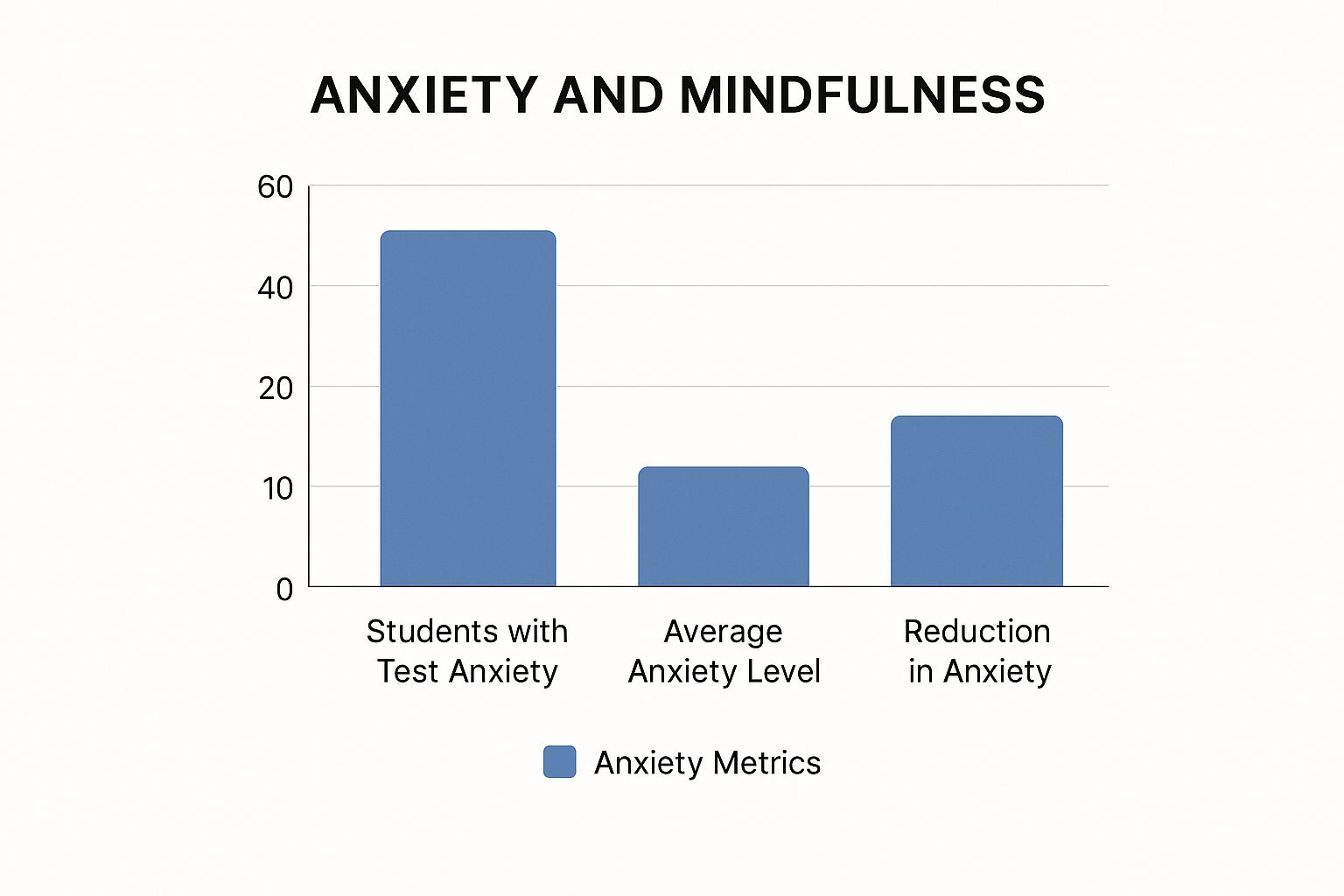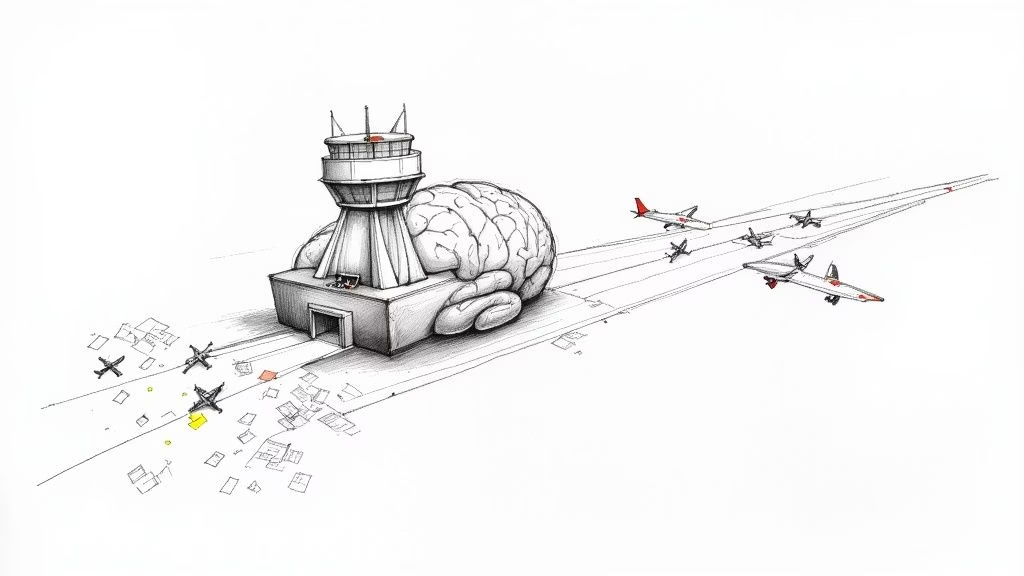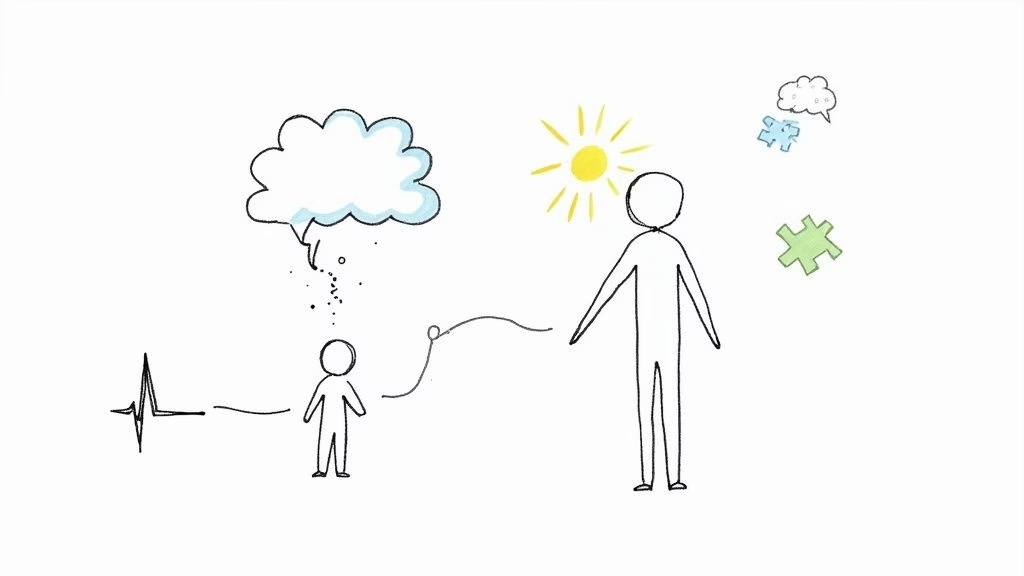To beat test anxiety, you need more than just good study habits. It’s about combining solid preparation with the right mental game—understanding what triggers your stress, learning how to quiet those negative thoughts, and building pre-test rituals that give you confidence, not panic.
What Is Test Anxiety and How Does It Feel?
We’ve all felt nervous before a big exam, but test anxiety is a whole different beast. It’s an intense form of performance anxiety where the pressure to do well completely hijacks your ability to think. A little stress can be a great motivator, but test anxiety is the tipping point where that pressure backfires, causing both physical and mental distress.
It’s that awful feeling when your brain goes completely blank, even on questions you know you know the answer to. You might feel your heart pounding, your palms getting sweaty, or a sick knot forming in your stomach. These aren’t just “in your head”—they are very real, physiological responses your body has to what it perceives as a threat.
Unpacking the Symptoms
Test anxiety shows up in your body, your thoughts, and your emotions. Being able to spot these signs is the first real step toward getting them under control.
To get a clearer picture, it helps to break down what you might be experiencing.
| Symptom Category | Common Examples |
|---|---|
| Physical | Headaches, nausea, racing heart, shallow breathing, sweating, feeling lightheaded or even faint. |
| Emotional | A sense of dread, intense fear of failure, feeling helpless or angry, profound disappointment in yourself. |
| Cognitive | Trouble concentrating, mind going blank, racing thoughts, obsessing over past poor performances or grades. |
Recognizing where your symptoms fall can help you target the right coping strategies.
This infographic breaks down some key data points, including just how many students are dealing with this and how effective certain strategies can be.

The numbers make it clear: test anxiety is incredibly common. But the good news is that targeted practices like mindfulness can make a real, measurable difference.
Why Does It Happen?
Test anxiety rarely stems from a single source. It’s usually a mix of things related to motivation, procrastination, and the immense pressure students feel from school, family, and even themselves.
A huge driver is the fear of failure. When you start tying your self-worth to a test score, the stakes feel impossibly high. That pressure might come from parents, teachers, or your own inner critic. Another major cause is a history of poor test performance, which can lock you into a self-fulfilling prophecy. You expect to do badly, and the anxiety from that expectation ends up sabotaging you all over again.
This isn’t a rare problem. Research shows that anxiety is a massive challenge for students in high-pressure academic fields. A global meta-analysis, for instance, found the prevalence of anxiety among medical students is around 33.8%. That’s a staggering number, and it highlights just how common this struggle is. You can dig deeper into these findings in the full study on student anxiety.
Beat Procrastination and Build Real Confidence

Let’s be honest: true confidence isn’t something you just wake up with. It’s something you build, brick by brick, through consistent, focused action. I’ve seen it time and again—procrastination is the biggest fuel for test anxiety. It creates a nasty cycle where feeling unprepared makes you anxious, and being anxious makes you want to avoid studying even more.
The only way out is to shift from passively worrying to actively preparing. This isn’t about “just studying more.” That kind of generic advice is useless when you’re completely overwhelmed. Instead, it’s about finding a system that works with your brain, not against it, and putting proactive strategies in place to regain a sense of control. That’s what really tames anxiety.
Create a Study Plan That Actually Works
The goal here isn’t to lock yourself in a room for eight hours straight. That’s just a recipe for burnout. The real secret is breaking down huge, intimidating subjects into small, manageable chunks that you can actually finish. This is where a few specific methods can be game-changers.
- Time-Blocking: Don’t just “plan” to study. Schedule specific blocks directly into your calendar and treat them like non-negotiable appointments. For example, put “Biology Review: Chapter 4” in your calendar for Tuesday from 4:00 PM to 4:45 PM. It’s on the schedule. It’s happening.
- The Pomodoro Technique: This is my personal favorite for fighting overwhelm. You use a timer to work in focused 25-minute sprints, then take a short break. It forces you into deep focus for a short period, which is way more effective than slogging through hours of distracted “studying.”
Every time you complete one of these small, scheduled tasks, you get a win. It’s a small victory, but those wins build momentum. They prove to your brain that you are capable and you are in control.
Key Insight: Confidence comes from competence. When you can look back at a week of completed study sessions, you have hard evidence of your preparation. That evidence is what quiets the anxious voice in your head telling you that you’re not ready.
How to Support Your Teen Without Adding to the Pressure
As a parent, watching your teen procrastinate can be maddening. It’s so easy to fall into the trap of nagging, but that usually just adds more pressure and makes them shut down. Your most powerful role is to be a supportive coach, not a drill sergeant.
Help them break down the mountain of work. Instead of asking, “Have you studied for your history final?” try a more targeted approach: “What’s one topic in history you could review for 20 minutes tonight?” This shifts the focus from an overwhelming task to a small, doable action.
You can also be the one who finds great resources. Organizations like the Child Mind Institute have a ton of excellent, expert-backed articles on teen mental health, motivation, and anxiety. Reading them can give both you and your teen a shared language and new strategies to try.
It’s important to remember this struggle is incredibly common. Test anxiety is a widespread issue, with some studies indicating that around 66% of school-aged children feel it on a moderate to high level. If you read more about these findings, you’ll see just how critical it is to build these anxiety-management skills early on.
Ultimately, your job is to create an environment where effort is praised more than grades. When you focus on the process—building good habits together—you help your teen develop the resilience and self-belief they need to face academic challenges with real, earned confidence.
Master Your Mindset Before and During the Test

Even if you’ve prepared perfectly, your own mind can become your biggest obstacle on test day. That inner voice of doubt and fear can easily sabotage your performance, creating a self-fulfilling prophecy. Learning to manage test anxiety in the moment is a skill—and like any skill, it gets stronger with practice.
The goal isn’t to erase nervousness completely. It’s about getting a handle on your emotional state so you can stay focused and actually access all the information you’ve worked so hard to learn.
It all starts with challenging the negative thoughts that fuel the panic. When your brain screams, “I’m going to fail this,” it’s not stating a fact; it’s just expressing a fear. You can actively step in and reframe this.
Instead of letting that thought spiral, counter it with real evidence: “I’ve studied for this. I did the work. I am prepared to do my best.” This isn’t about some fake positivity; it’s about grounding yourself in the reality of your preparation.
Discreet Techniques to Use Anywhere
When you feel that wave of anxiety rising during an exam, you need simple, subtle tools that can calm your nervous system without drawing attention. These are quick, practical exercises you can do right at your desk.
- Box Breathing: This is a powerful, yet very subtle, breathing technique. Inhale slowly for four counts, hold your breath for four, exhale slowly for four, and then hold again for four. Repeat this cycle three or four times. It forces your breathing to slow down, which sends a signal to your brain that it’s okay to relax.
- The 5-4-3-2-1 Grounding Method: This technique is fantastic for pulling you out of your anxious thoughts and back into the present moment. Silently, identify: 5 things you can see, 4 things you can feel (your chair, the desk, your feet on the floor), 3 things you can hear, 2 things you can smell, and 1 thing you can taste.
These methods are so effective because they break the cycle of racing thoughts and physical panic. They give you a moment to reset and get your focus back on track.
Key Takeaway: You don’t have to be a victim of your anxious thoughts. By actively challenging them and using grounding techniques, you can interrupt the anxiety spiral and reclaim control over your mental state during a test.
Finding What Coping Style Works for You
Everyone is different, and what works for one person might not work for another. Research has actually shown that various coping mechanisms are effective for managing academic stress.
A 2022-2023 study of medical students found that over 50% of them used emotion-focused strategies, like self-distraction or talking with friends, to handle the pressure of exams. The same study confirmed that adaptive techniques—like cognitive restructuring (that reframing we talked about) and relaxation exercises—are statistically linked to lower anxiety levels. You can read the full research about these coping mechanisms to see the science behind them.
For teens and their families, finding expert-backed mental health resources is also a huge help. Organizations like the National Institute of Mental Health (NIMH) offer a ton of information on anxiety in young adults, giving you a reliable place to start understanding these challenges on a deeper level.
The key is to experiment. Try a few things and find the right combination of mental tools that genuinely work for you.
How Parents Can Support a Teen with Test Anxiety
As a parent, your first instinct is probably to jump in and fix whatever is stressing your teen out. I get it. But when it comes to something like test anxiety, your role needs to shift from a problem-solver to a supportive coach.
It’s about creating a home environment that lowers the temperature, instead of turning up the heat. This means focusing on the person, not just the grade.
The words you choose have a huge impact. Instead of saying something like, “You have to get an A on this,” which just piles on the pressure, try opening the door for a real conversation. A simple, “I know this test is a big deal. How are you feeling about it?” can make all the difference.
This small switch changes the dynamic. It’s no longer a demand; it’s an invitation for them to share what’s actually going on in their head. It shows them their stress is valid, not something to be ignored.
Fostering a Supportive Home Environment
Beyond emotional support, practical help with the fundamentals can make a world of difference. When a teen is well-rested and has a handle on their schedule, their baseline anxiety drops, making it much easier to manage the stress that comes with big exams.
Take a look at their schedule with them. Procrastination isn’t always laziness—more often than not, it’s a direct symptom of feeling overwhelmed. Help your teen break down a massive study plan into small, bite-sized tasks. Then, celebrate those small wins. This teaches them to value effort over a specific outcome.
And sleep? That’s non-negotiable. A tired brain is an anxious brain. Protecting their sleep schedule is one of the most powerful things you can do.
Your main goal isn’t to get rid of all stress—that’s impossible. It’s to show your teen how to handle it in a healthy way. By modeling constructive coping skills, you’re teaching them how to build long-term resilience that goes far beyond a single test score.
Finding Reliable Mental Health Resources
Knowing where to turn for help is just as important as the support you provide at home. While test anxiety is common, sometimes it can be a red flag for a deeper issue. It’s crucial to recognize when it’s time to bring in a professional.
Here are a few excellent resources I often recommend to parents and teens:
- The Jed Foundation (JED): This organization is fantastic. They offer straightforward guides and tools specifically for teens and young adults, covering everything from managing stress to understanding depression.
- Anxiety & Depression Association of America (ADAA): A great source for reliable information, webinars, and articles on different types of anxiety and proven treatment options.
- Your Teen’s School Counselor: Don’t overlook this resource. School counselors are trained to help students with academic stress and can be your first stop. They can also connect you with trusted local mental health professionals if that’s the right next step.
For parents looking to give their teens practical tools to tackle procrastination, build real motivation, and navigate school challenges, a coaching program can be a game-changer. At Andrew Petrillo Life Coaching, we don’t just talk about problems; we give teens a personalized playbook to build genuine confidence and overcome what’s holding them back. You can learn more about our coaching approach and how we help teens stop struggling and start thriving.
Design Your Own Pre-Test Ritual for Peak Performance

The 24 hours leading up to a test are critical. This is where you pivot from grinding away at new material to strategic rest, giving your brain the space it needs to consolidate everything you’ve studied. A personal pre-test ritual isn’t just a quirky habit; it’s a powerful tool to automate your actions, cut down on day-of chaos, and help you walk in feeling in control.
Forget the all-night cramming sessions fueled by energy drinks. I’ve seen it time and time again—it almost always does more harm than good. Research backs this up, showing that sleep-deprived, last-minute studying skyrockets anxiety while barely making a dent in retention.
Your brain needs that downtime to actually process and store information. The night before, a light, final review of your notes is fine, but then you have to switch gears. Put the books away. Do something that actually calms you down—watch a movie, listen to music, go for a walk. This isn’t slacking off; it’s a crucial step in managing test anxiety.
Craft Your Test-Day Morning Plan
Your morning routine sets the tone for the entire day. The goal here is simple: eliminate as many decisions as possible to conserve your mental energy for the test itself.
Plan these details the night before:
- Organize Your Gear: Lay out everything you need. Pencils, calculator (with fresh batteries!), student ID, water bottle—you name it. Nothing spikes morning panic like a frantic, last-minute search for a protractor you haven’t seen in weeks.
- Pick Your Outfit: Choose something comfortable. Seriously. You don’t want to be distracted by tight jeans or an itchy sweater when you’re trying to focus on a tough question.
- Plan a Brain-Boosting Breakfast: Aim for a balanced meal with protein and complex carbs, like eggs with whole-wheat toast or oatmeal with fruit. Stay away from sugary cereals that will lead to a hard energy crash an hour into the exam. For parents, this is a simple but massive way to help—having these healthy options ready can make a huge difference.
By preparing everything the night before, you create a morning that is calm and automatic. This ritualistic approach frees up your mental bandwidth, allowing you to walk into the testing room feeling composed and ready to perform.
Finding Support and Resources for Teens
Building these habits alone can feel isolating, and sometimes procrastination and a lack of motivation are signs that more targeted support could be the answer.
Luckily, there are some excellent resources out there specifically for teen mental health. Organizations like The Jed Foundation (JED) provide clear, actionable advice for teens on navigating stress and anxiety. The Anxiety & Depression Association of America (ADAA) is another great source for in-depth information on proven strategies for tackling anxiety.
For teens and parents who want a more structured plan to build skills around motivation, time management, and overcoming procrastination, a coaching program can provide that much-needed accountability and guidance. At Andrew Petrillo Life Coaching, we help teens develop a personalized playbook to manage academic pressure and build genuine, lasting confidence.
You can learn about our approach and see how we guide teens from feeling completely overwhelmed to feeling empowered and in control.
Your Top Questions About Test Anxiety, Answered
We’ve covered a lot of ground on how to dial down test anxiety, from practical prep to shifting your mindset. But I know there are still some lingering “what if” questions that pop up for students and parents. Let’s tackle some of the most common ones I hear.
What If I Have a Panic Attack During a Test?
First, take a breath. I know it feels like the world is ending, but what you’re feeling is temporary. Your body is having a physiological reaction, and you can guide it back to calm. Don’t judge yourself for it; just acknowledge what’s happening.
Press your feet firmly into the floor. Feel the solid ground beneath you. This simple grounding technique can pull you out of your head and back into your body. Then, quietly start a slow breathing pattern—inhale for four, hold for four, exhale for four. No one will even notice. If you can, ask for a quick restroom break. Giving yourself a moment of privacy to reset can be a game-changer. Remember, this is just your body’s alarm system going off—it’s not a reflection of your intelligence or how hard you prepared.
How Can I Stay Motivated When I Feel Totally Overwhelmed?
Here’s a secret: motivation almost always follows action, not the other way around. When you feel that sense of dread and the pull of procrastination, the trick is to make the first step laughably small. Don’t think about the three-hour study marathon ahead. Just commit to 15 minutes.
Set a timer. That’s it. More often than not, just getting started is the hardest part. Once that timer goes off, you might find you’ve built enough momentum to keep going. It also helps to zoom out and reconnect with your “why.” Are you studying for that one class you need to get into your dream college? Or building skills for a future career? Tying the small, daily grind to a much bigger, more exciting goal is powerful fuel for a tired mind.
A key part of teen mental health is understanding the link between action and emotion. Small, consistent actions build a sense of competence, which directly combats the feelings of helplessness that anxiety and procrastination can create.
Do Diet and Sleep Really Make That Much of a Difference?
Absolutely. Stop thinking of sleep and nutrition as afterthoughts and start treating them like your most important study tools. Because that’s what they are. Sleep isn’t just rest; it’s when your brain gets to work consolidating memories and locking in everything you just learned. When you’re sleep-deprived, you’re not just tired—your cognitive function is actively impaired, and your baseline anxiety levels shoot up.
What you eat matters just as much. A sugary snack might give you a quick jolt, but the inevitable crash that follows will kill your focus. Your brain needs steady fuel. Think balanced meals with protein and complex carbs to provide sustained energy. And be smart about caffeine—too much can mimic and amplify anxiety symptoms like a racing heart and jitters, making everything feel worse. Building solid physical habits is the foundation for mental resilience.
When Is It Time to Get Professional Help?
If test anxiety is doing more than just causing a few pre-test jitters, it might be time to bring in a professional. It’s a sign of strength, not weakness, to ask for help. Keep an eye out for these red flags:
- School Avoidance: Your teen is actively trying to get out of going to school or specific classes on test days.
- Grades Are Suffering: Their performance on tests is consistently poor, even when you know they’ve put in the work and understand the material.
- Physical Symptoms: They complain frequently about stress-induced headaches, stomachaches, or other physical pains tied to school pressure.
If you’re seeing these patterns, a school counselor is a great place to start. For more targeted support, a therapist or coach can introduce powerful tools like Cognitive Behavioral Therapy (CBT), which is incredibly effective for managing anxiety. There are also fantastic online resources—the Child Mind Institute and The Jed Foundation (JED) both offer expert-backed guidance for parents and teens navigating the pressures of school and mental health.
At Andrew Petrillo Life Coaching, we help teens break the cycle of procrastination and anxiety with a structured, supportive program. Together, we build real-world skills in time management, emotional regulation, and goal setting, giving them the tools they need to build genuine confidence and succeed on their own terms. You can learn more about our coaching approach and how we can help.
Article created using Outrank



















